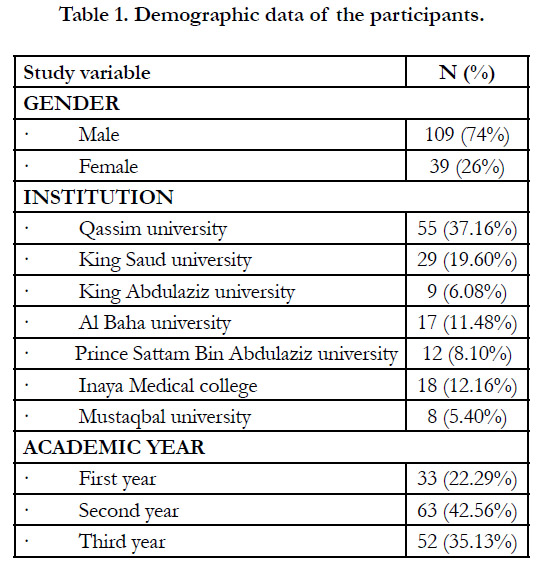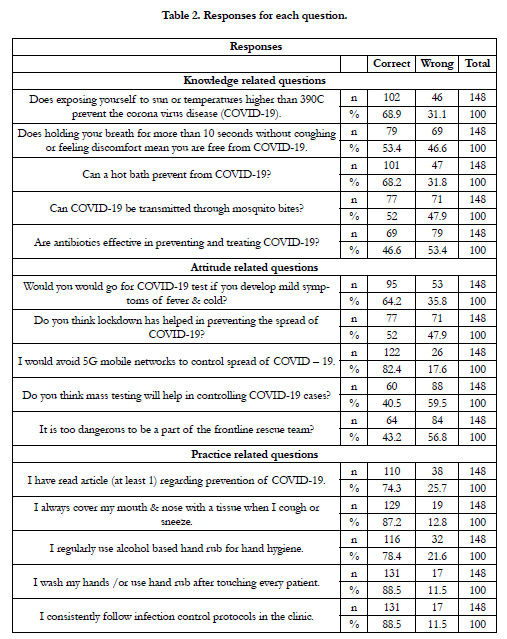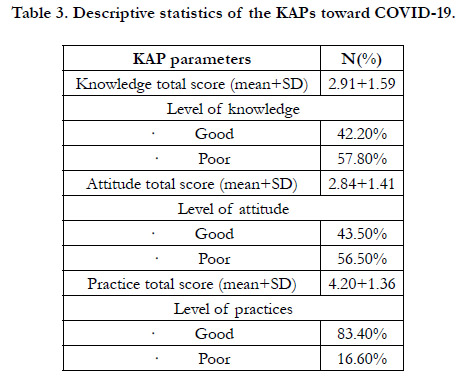Knowledge, Attitude and Practices of Saudi Dental Hygiene Students Towards Novel Corona Virus Disease (Covid-19): An Online Survey
Dr. Mushir Mulla*
Assistant Professor, Department of Oral Health, Qassim University, KSA.
*Corresponding Author
Dr. Mushir Mulla,
Assistant Professor, Department of Oral Health, Qassim University, KSA.
Tel: +966 561691518
E-mail :m.mulla@qu.edu.sa
Received: July 23, 2021; Accepted: November 10, 2021; Published: November 15, 2021
Citation: Mushir Mulla. Knowledge, Attitude and Practices of Saudi Dental Hygiene Students Towards Novel Corona Virus Disease (Covid-19): An Online Survey. Int J Dentistry Oral Sci. 2021;8(11):5009-5012. doi: dx.doi.org/10.19070/2377-8075-210001009
Copyright: Mushir Mulla©2021. This is an open-access article distributed under the terms of the Creative Commons Attribution License, which permits unrestricted use, distribution and reproduction in any medium, provided the original author and source are credited.
Abstract
Purpose: Healthcare workers involved in procedures, that generate aerosol or handling patient specimens, are associated with
a high possibility of COVID-19 infection. Thus, this study was conducted to identify dental hygiene students’ knowledge of
various guidelines related to COVID-19, their attitude towards COVID-19, and to assess their practices regarding COVID-19
recommendations.
Methods: A cross-sectional questionnaire study was performed. All Dental hygiene students in Saudi Arabia were invited to
participate in this study. Interns were excluded. An online version of pre-tested and validated questionnaire was used to test
the KAP for COVID 19.
Results: The mean score for knowledge related questions was found to be 2.91 ± 1.59, attitude related questions to be 2.84
± 1.41 and for practice related questions to be 4.20 ±1.36. After converting the scores into percentages, any score <60% was
categorized as poor score, 60-80% as average score and >80% as good score. Regarding the knowledge of Dental hygiene
students towards COVID-19, they had poor knowledge with the score of 57.8%. Similarly, the attitude of Dental hygiene students
towards COVID-19 was poor as the score was 56.5%. But the practice of Dental hygiene students towards COVID-19
was found to be good with the score of 83.4%.
Conclusion: The outcome of this cross-sectional study shows that most of dental hygiene students studying in Kingdom of
Saudi Arabia are following good practices toward COVID-19 inspite of having poor knowledge and attitude.
2.Introduction
3.Materials and Methods
3.Results
4.Discussion
5.Conclusion
5.References
Keywords
Gardner Syndrome; Osteoma; Odontomes; Impacted Teeth; Sebaceous Cyst.
Introduction
Coronavirus disease 2019 (COVID-19) is a pandemic that is
caused by a novel human corona virus CoV. Sufficient research
has stated that the COVID-19 can be transmitted from infected
patients through saliva, inhalation of droplets (particles diameter
= 5 µm) generated by coughing and sneezing, as well as by direct
contact with oral, nasal and ocular mucous membranes.[1-3]
Healthcare workers involved in procedures, that generate aerosol
or handling patient specimens, are associated with a high possibility
of COVID-19 infection.[4] Thus, the risk for cross-infection
is high among dentists.[5] Dental hygienists are also at high risk as
they also perform several aerosol-generating procedures, such as
the removal of calculus and bacterial plaque. But usually, the people’s
subjective judgements lead to the work area risk perception.
Thus, it is very important for the health workers to understand
the knowledge related to transmission, prevention, and protocols
of COVID-19. This will subsequently reduce the crossinfection
and will help them to work more cautiously and stressfree. To the
best of our knowledge no study has been published regarding the
assessment of knowledge, attitude and practices among the dental
hygiene students in Kingdom of Saudi Arabia.
Thus, this study was conducted to identify dental hygiene students’
knowledge of various guidelines related to COVID-19,
their attitude towards COVID-19, and to assess their practices
regarding COVID-19 recommendations.
Materials And Methods
A cross-sectional questionnaire study was performed. The questionnaire
used for the study was pre-tested and validated among dental hygiene students of Qassim University, Saudi Arabia. Prior
to the commencement of the study, ethical clearance was obtained
from institutional ethical committee of Qassim University, Saudi
Arabia. 30 dental hygiene students enrolled for the pilot study
to assess the ease of understanding and clarity of the questions.
Based on their feedback final questionnaire was prepared which
consisted of 18 questions. An online version (Google forms) of
the questionnaire was used to collect data from the participants.
All dental hygiene students from Kingdom of Saudi Arabia were
invited to participate in this questionnaire based study. Interns
were excluded from this study. The questionnaire was divided into
two sections: the first section included a statement of anonymity
and consent and also the socio-demographic details of the participants;
the second section had closed ended items that measured
KAPs related to COVID-19. The data were collected using
an online questionnaire (Google forms). The questionnaire was
sent to the students via email or phone. Counts and proportions
were used to present all categorical variable data whereas means
± standard deviations were used to present continuous variables.
Results
This study was conducted to assess and evaluate the level of
KAP’s regarding COVID-19 among dental hygienists in Saudi
Arabia. This will help to determine their level of preparedness
in screening and dealing with infected patients. Our questionnaire
included questions that measured knowledge, attitude, and
practice and was sent to dental hygiene students. There areseven
dental hygiene colleges in the Kingdom of Saudi Arabia. The
questionnaire was sent to 210 dental hygiene students in these
seven colleges across Saudi Arabia. Finally, 148 completed responseswere
received, which were included for the final analysis.
Thus, response rate of 70.47% was obtained. Table 1 shows the
demographic data of the participants.
The questionnaire consisted of fiveknowledge related questions,
five attitude related questions and five practice related questions.
The students had to select from the given three options which
were Agree, Don’t know or Disagree. Each correct answer was
given 1 point and wrong answer was given 0 point. The mean
score for Knowledge related, attitude related and practice related
questions was calculated.
The mean score for knowledge related questions was found to be
2.91 ± 1.59, attitude related questions to be 2.84 ± 1.41 and for
practice related questions to be 4.20 ±1.36.
After converting the scores into percentages, any score <60% was
categorized as poor score, 60-80% as average score and >80% as
good score. Table 2 shows the responses for each question.
Regarding the knowledge of Dental hygiene students towards
COVID-19, they had poor knowledge with the score of 57.8%.
Similarly, the attitude of Dental hygiene students towards COVID-
19 was poor as the score was 56.5%. But the practice of Dental
hygiene students towards COVID-19 was found to be good
with the score of 83.4%. Table 3 shows Descriptive statistics of
the KAPs toward COVID-19 (n = 148).
The results showed that most of the students responded appropriately
for practice related questions. Whereas, most of the students
lacked in the knowledge and attitude related questions.
Discussion
Various KAP studies have been performed on the population of
Saudi Arabia. These studies identified the general people’s knowledge,
attitude and practice on COVID-19 in Saudi Arabia. [6-9]
But to the best of authors’ knowledge, this is the first study that
investigated COVID-19-associated KAPs among dental hygiene
students in Kingdom of Saudi Arabia. Coronavirus (COVID-19)
is a new virus that has rapidly spread around the world. Many
countries have seen huge number of cases and deaths within short
period of time. The major challenges related to fighting this pandemic
are largely related to matters concerning the proper knowledge
and accurate practice for combatting the disease spread.Similar
to most of the respiratory viruses, SARS-CoV-2 also spreads from one to person to another through mucous secretion or saliva
in the form of droplets, aerosols, or fomites.[10, 11]
Various theories have been proposed regarding the disease in the
last few months. As the disease is relatively new, not many literatures
are available. Misinformation and myths have also been
spreading fast among the people. Thereby it becomes difficult to
work without causing unnecessary panic and stress.Thus, all the health workers need to have correct knowledge regarding COVID-
19 so that they can work efficiently on patients. Hence, this
research was conducted to determine the KAP related to COVID-
19 among dental hygiene students.
Most of the students in this present research were not aware
about the diseaseand had poor knowledge and attitude regarding
COVID-19. 31.8% students were unaware that COVID 19 can
be transmitted through mosquito bites or not.Also, 37.8% students
didn’t know whether antibiotics are effective in preventing
and treating the new corona virus (COVID-19) or not. Regarding
mass testing, 42.6% students didn’t know whether this will help in
controlling the pandemic or not. Thus, it is very important to provide
proper and correct knowledge to these students as they are
also working in high risk area for disease transmission. Whereas,
a cross-sectional study was conducted among Qassim University
students in different medicalfields and was found that they were
well-informed of basic information and had positive attitudes
and proactive practices toward COVID-19.[12] The KAPs related
to COVID-19 and clinical practice among dentists practicing in
Saudi Arabia were also found to be satisfactory.[13]
Although the present study showed poor attitude amongst the
dental hygiene students, they showed good practice (83.4%)
against this pandemic outbreak. A study done in China also
showed good practice against this pandemic outbreak.[14]
The good practice score observed in this study can be attributed
to the student’s infection control protocol observed in the clinical
practice against spread of any infectious disease. Being the healthcare
workers, it is necessary for Dental hygiene students to have
proper knowledge and attitude. With adequate knowledge they’ll
be able to impart correct knowledge to the patients and masses
as public awareness of dealing with infectious respiratory diseases
plays an important role in limiting the infection's spread.
Conclusion
The outcome of this cross-sectional study shows that most of
dental hygiene students studying in Kingdom of Saudi Arabia
are following good practices toward COVID-19 inspite of having
poor knowledge and attitude. Institutions can overcome this
by motivating continuous research and relying only on authentic
published reports.
Acknowledgments
I am thankful to Mr. Ibrahim Al Khelaiwi for helping me reach
out to the dental hygiene students in the Kingdom of Saudi Arabia.
References
-
[1]. Lai CC, Shih TP, Ko WC, Tang HJ, Hsueh PR. Severe acute respiratory syndrome
coronavirus 2 (SARS-CoV-2) and coronavirus disease-2019 (COVID-
19): The epidemic and the challenges. Int J Antimicrob Agents. 2020
Mar;55(3):105924. PubMed PMID: 32081636.
[2]. Lu CW, Liu XF, Jia ZF. 2019-nCoV transmission through the ocular surface must not be ignored. Lancet. 2020 Feb 22;395(10224):e39. PubMed PMID: 32035510.
[3]. Belser JA, Rota PA, Tumpey TM. Ocular tropism of respiratory viruses. MicrobiolMolBiol Rev. 2013 Mar;77(1):144-56. PubMed PMID: 23471620./
[4]. Michaels D, Wagner GR. Occupational Safety and Health Administration (OSHA) and Worker Safety During the COVID-19 Pandemic. JAMA. 2020 Oct 13;324(14):1389-1390. PubMed PMID: 32936212.
[5]. Volgenant CMC, de Soet JJ. Cross-transmission in the Dental Office: Does This Make You Ill? Curr Oral Health Rep. 2018;5(4):221-228. doi: 10.1007/s40496-018-0201-3. PubMed PMID: 30524929.
[6]. Alhazmi A, Ali MHM, Mohieldin A, Aziz F, Osman OB, Ahmed WA. Knowledge, attitudes and practices among people in Saudi Arabia regarding COVID-19: A cross-sectional study. J Public Health Res. 2020 Sep 18;9(3):1867. PubMed PMID: 33042899.
[7]. Al-Hanawi MK, Angawi K, Alshareef N, Qattan AMN, Helmy HZ, Abudawood Y, Alqurashi M, Kattan WM, Kadasah NA, Chirwa GC, Alsharqi O. Knowledge, Attitude and Practice Toward COVID-19 Among the Public in the Kingdom of Saudi Arabia: A Cross-Sectional Study. Front Public Health. 2020 May 27;8:217. PubMed PMID: 32574300.
[8]. Almofada SK, Alherbisch RJ, Almuhraj NA, Almeshary BN, Alrabiah B, Al Saffan A, Baseer MA. Knowledge, Attitudes, and Practices Toward COVID- 19 in a Saudi Arabian Population: A Cross-Sectional Study. Cureus. 2020 Jun 29;12(6):e8905. PubMed PMID: 32637289.
[9]. Mohammed J. Almalki. Knowledge, attitudes and practices towards COVID- 19 in Saudi Arabia: Planning implications for public health pandemics, 14 September 2020, PREPRINT (Version 1) available at Research Square.
[10]. Jayaweera M, Perera H, Gunawardana B, Manatunge J. Transmission of COVID-19 virus by droplets and aerosols: A critical review on the unresolved dichotomy. Environ Res. 2020 Sep;188:109819. PubMed PMID: 32569870.
[11]. Wang J, Du G. COVID-19 may transmit through aerosol. Ir J Med Sci. 2020 Nov;189(4):1143-1144. PubMed PMID: 32212099.
[12]. Aldukhayel A, Alhomidani RJA, Almazyad NS, et al. Knowledge, attitude, and practices associated with COVID-19 among university students: a cross-sectional survey in Qassim Region, Saudi Arabia. IJMDC 2020; 4(10):1554–1560.
[13]. Alharbi AJ, Alharbi KE, Kolarkodi SH, Elmoazen R. Knowledge, Attitude, and Preparations Toward COVID-19 among Dentists in Saudi Arabia: An Online Survey. IJMDC 2020; 4(11): 1879-1886.
[14]. Abdelhafiz AS, Mohammed Z, Ibrahim ME, Ziady HH, Alorabi M, Ayyad M, Sultan EA. Knowledge, Perceptions, and Attitude of Egyptians Towards the Novel Coronavirus Disease (COVID-19). J Community Health. 2020 Oct;45(5):881-890. PubMed PMID: 32318986.








